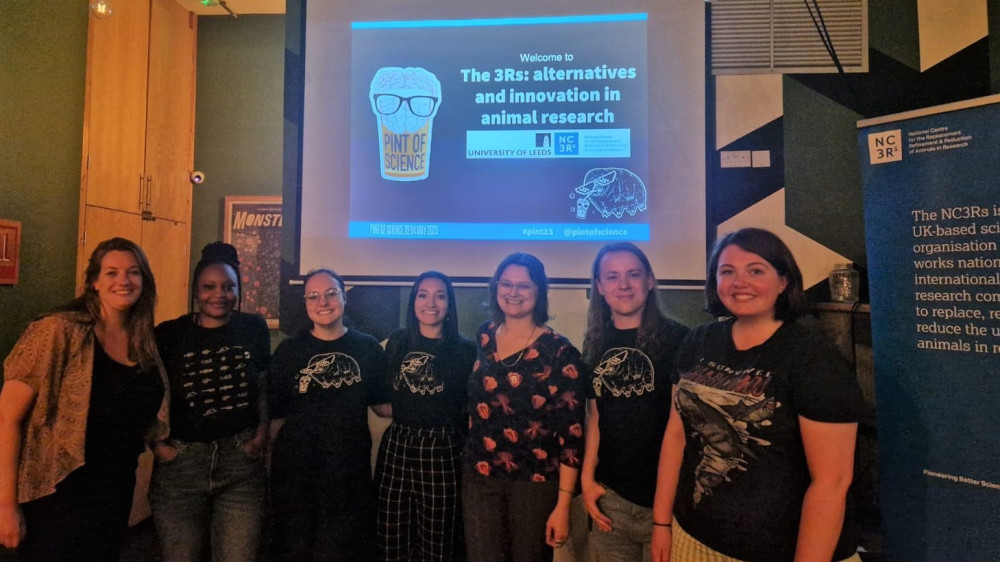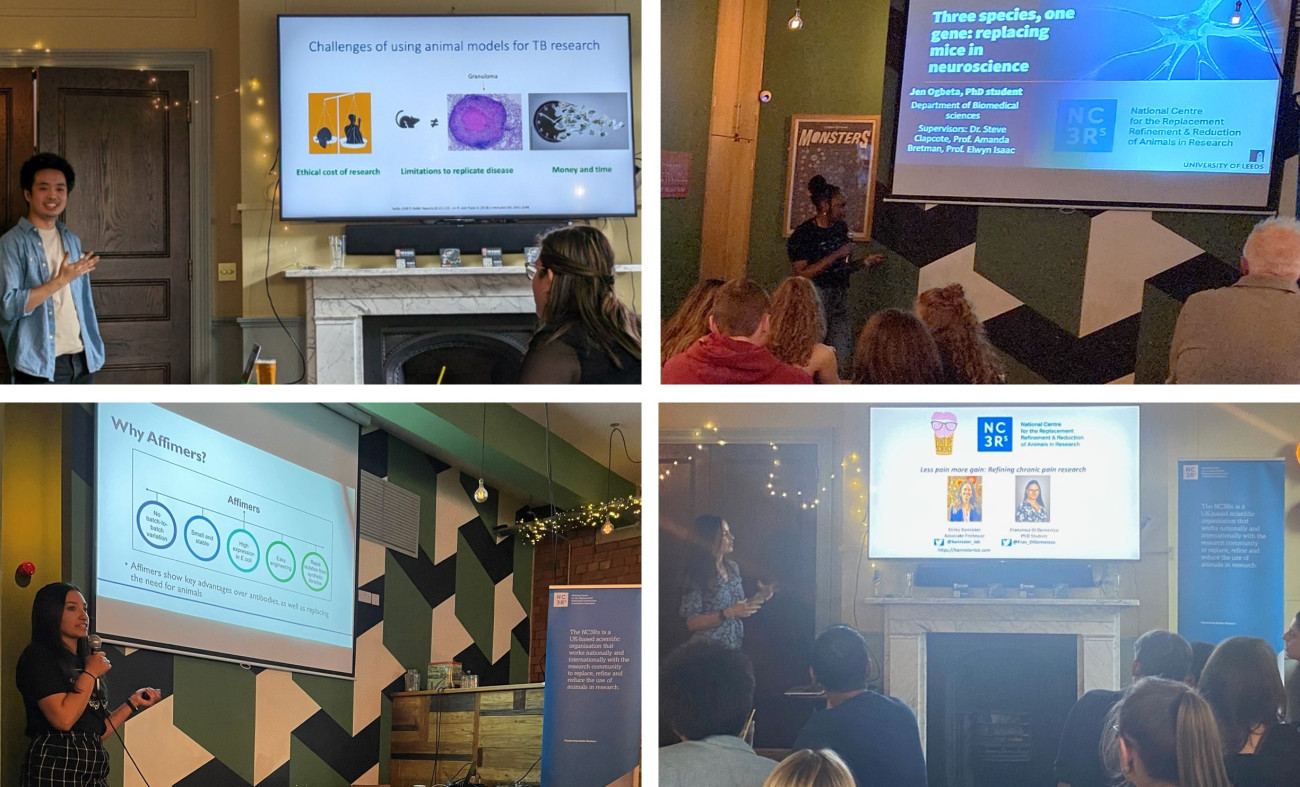Effective and engaging communication for 3Rs research

Exploring the value of engagement and a helpful how-to guide for effective communication.
Contents
Why does communication matter?
Clear and concise communication is a fundamental skill for scientists. When thinking about science communication, many researchers will picture giving a public lecture or organising activities for open days. Whilst these sorts of public engagement events are an important part of a researchers’ remit, good communication underpins many of the day-to-day activities of a scientific career. Scientific communication is writing publication abstracts and grant applications, it is effective networking, collaboration and mentorship, and it is presenting conference posters, lab meetings and departmental talks.
Effective communication to support your scientific career focuses on the ‘why?’. Why should a peer read your research paper, why should a funding body support your project or why should the public be interested in your work? By communicating the benefits of your research to both science and society you can increase the impact and influence of your work.
For NC3Rs researchers, effective science communication is critical to bridge the 3Rs valley of death – the often long lag between the development and uptake of 3Rs advances.
How to communicate 3Rs research
We have produced a guidance document on how to write effectively about the 3Rs in grant applications – whilst this focuses on written communication to secure funding, many of these principles apply to other forms of communication for different audiences and purposes.
Targeting your audience
The starting point for effective communication is knowing your audience. You may want to communicate with a range of different groups, each with different expertise, values and interests. Taking a moment to consider who you are communicating with and what you aim to achieve will ensure the content, style and tone is tailored to most effectively communicate your message.

Communicating a clear take-home message has two elements: engagement and understanding. To hold your audience’s attention consider what is important and interesting to your them and where this intersects with your research. People are most engaged with messages that are specific and relevant to their lives – for example, include tangible benefits that relate to your audience’s experiences or actionable suggestions they can implement in their work.
Pitching your content to your audience’s background and expertise is a balancing act of accuracy and accessibility. For a specialist scientific audience, technical details and supporting data may add credibility to increase the impact of your message – the same information may obscure and dilute your message for a general audience. Similes, metaphors and analogies can be helpful tools to explain complex concepts to lay audiences in an accessible and engaging way. No matter who your audience is, using short, simple sentences makes written communication clear, concise and easier to understand.
Highlighting the 3Rs
Be clear about how your work replaces, reduces or refines the use of animals and use these words to describe the impact of your research. Including realistic and justified metrics to support this message increases the authority and impact of your statement.
Be mindful when using the words replace, reduce and refine to ensure the 3Rs are communicated accurately.
Use replace/replacement to describe alternative methods used instead of an animal experiment. Whilst replacement of animals in a certain experiment within a programme of research results in fewer animals used overall, this is still a replacement rather than a reduction.
Reduce/reduction should be used to describe minimising the number of animals required for a specific experiment, for example through robust experimental design or non-invasive longitudinal imaging.
Refine/refinement is reserved for advancements to animal welfare and should not be used to describe optimising protocols for purely scientific or practical purposes. You can also highlight that high standards of animal welfare are the basis of reliable and informative in vivo experiments.
Addressing animal use
3Rs research ultimately aims to replace, reduce or refine the use of animals. This goal sets important context for your work and these 3Rs benefits should form the centre of your message. Use accurate, non-emotive language to describe in vivo experiments and the experience of animals. Highlight how your approach advances the 3Rs and improves upon currently used methods.
It is important to be aware that the use of animals for scientific research and testing can be an emotive and controversial topic, particularly when communicating with audiences outside of the scientific field. Remaining transparent and open about how, and why, animals are used is important to maintain public trust in science. Include the aims of your research, and how the 3Rs contribute to better science.
Public engagement
Conversations between academics and non-scientists can be insightful and inspirational for both. For scientists, bringing your research to a public forum can give you valuable new perspectives and increase the societal impact of your work, whilst building your experience in science communication, public speaking or organising activities and events. Meanwhile the opportunity for the general public to engage with a working research scientist can answer questions and spark curiosity in all age groups.
As a publicly funded organisation, NC3Rs-funded researchers are ultimately supported by the taxpayer. This responsibility to communicate the benefits of 3Rs advances to both science and society supports the NC3Rs mission and provides valuable personal and professional development opportunities for our grant holders.
A main stay of our public engagement programme is the annual Pint of Science festival. As Pint of Science partners we have been sponsored events each year for almost a decade. Our 2023 programme saw eight NC3Rs researchers share their research in pubs around the country. Every talk gave a platform to an NC3Rs-funded PhD student or postdoc to showcase their work – for many, this was their first opportunity to share their projects outside of their lab or give a public presentation.

From PhD students to Principal Investigators, our speakers tell us what an enjoyable and valuable experience public engagement is for them. We encourage all NC3Rs-funded researchers to embrace the opportunities offered by public engagement and offer funding to support a diverse programme of researcher-led events and activities.
NC3Rs support and opportunities
Public engagement awards
The NC3Rs public engagement awards scheme invites you to step out of the lab and share your research with new audiences. The scheme has supported NC3Rs-funded researchers to develop and deliver a range of thought-provoking activities across the UK since 2014. As part of our 20-year anniversary celebrations we are opening the awards scheme to all 3Rs-minded scientists in the UK and increasing the funding available to £2,000. The awards will support almost any type of project that engages the public with 3Rs advances and innovation, and applicants are encouraged to be imaginative and creative in how they engage with their intended audience. Applications that support early careers researchers to develop their science communication skills are particularly welcomed.
Early careers researchers
As part of our mission to pioneer better science, we aim to equip the next generation of scientific leaders with the confidence and skills required to maximise the benefits of research for science and society.
Our Early Career Engagement awards scheme supports NC3Rs-funded final year PhD students, Fellows and postdocs to build the 3Rs legacy of their research. The funding has supported a range of dissemination activities to achieve wider awareness and uptake of 3Rs advances, including organising and attending conferences, developing training resources and establishing new collaborations.
We are committed to embedding effective communication in the training and development of early careers researchers to empower them to maximise the 3Rs impact of their work. Giving NC3Rs-funded PhD students the skills and confidence to present their work and talk about the 3Rs is a central theme of our annual summer school. We are aiming to offer 3Rs science communication training to early careers researchers across institutions and funders – subscribe to our monthly newsletter to stay up to date with the latest training opportunities.
Contact Dr Genevieve Barr, NC3Rs Science Manager for Communications for support with communicating your 3Rs research: genevieve.barr@nc3rs.org.uk.
